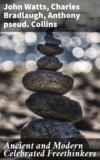Buch lesen: «Ancient and Modern Celebrated Freethinkers», Seite 15
ZENO, THE STOIC
In the previous number we gave a short sketch of the opinions of Epicurus. In this we shall deal with the founder of a rival sect – the Stoics. Amongst the disciples and students in the Stoic schools have been many illustrious names, and not the least worthy is the name with which we are now dealing.
Zeno was born at Cittius, a small maritime town in the Island of Cyprus. This place having been originally peopled by a colony of Phoenicians, Zeno is sometimes called a Phoenician; but at the period when he flourished, it was chiefly inhabited by Greeks. The date of his birth is uncertain, but must have been about the year B.C. 362. His father was a merchant, and Zeno appears to have been, in the early part of his life, engaged in mercantile pursuits. He received a very liberal education from his father, whom, we are told, perceived in his son a strong inclination for philosophical studies, and who purchased for Zeno the writings of the Socratic philosophers; which were studied with avidity, and which undoubtedly exercised a considerable influence over his future thinkings. When about thirty years of age, he made a trading voyage from Cittius to Athens, with a very valuable cargo of Phoenician purple, but was unfortunately shipwrecked on the coast of Greece, and the whole of his freight destroyed. It is supposed that this severe loss, which must have considerably reduced his means, materially influenced Zeno, and induced him to embrace the tenets of the Cynics, whose leading principle was a contempt of riches. We are told that upon is first arrival in Athens, he went into the shop of a bookseller, and took up, by accident, a volume of the "Commentaries of Xenophon." Alter reading a few pages, Zeno was so much delighted with the work, that he asked the bookseller to direct him where he might meet such men as the author? Crates, the Cynic philosopher, passed by at the time, and the bookseller said, "Follow that man!" He did so, and after listening to several of his discourses, was so pleased with the doctrines of the Cynics, that he became a disciple. He did not long remain attached to the Cynic school – their peculiar manners were too gross for him; and his energetic and inquiring mind was too much cramped by that indifference to all scientific investigation which was one of their leading characteristics. He therefore sought instruction elsewhere, and Stilpo, of Megara, became his teacher, from whom he acquired the art of disputation, in which he afterwards became so proficient. The Cynics were displeased at his following other philosophy, and we are told that Crates attempted to drag him by force out of the school of Stilpo, on which Zeno said, "You may seize my body, but Stilpo has laid hold of my mind." The Megaric doctrine was, however, insufficient. Zeno was willing to learn all that Stilpo could teach, but having learned all, his restless and insatiable appetite for knowledge required more, and after an attendance of several years upon the lectures of Stilpo, he passed over to the expositors of Plato, Xenocrates, and Polemo. The latter philosopher appears to have penetrated Zeno's design in attending the various schools —i. e., to collect materials from various quarters for a new system of his own; and when he came to the school, Polemo said, "I am no stranger, Zeno, to your Phoenician arts; I perceive that your design is to creep slily into my garden, and steal away my fruit." After twenty years of study, having mastered the tenets of the various schools, Zeno determined to become the founder of a sect himself. In accordance with this determination, he opened a school in a public portico, called the Painted Porch, from the pictures of Polygnotus, and other eminent painters, with which it was adorned. This portico became famous in Athens, and was called (Stoa) – the Porch. From this Stoa the school derived its name, the students being called the Stoics. Zeno was a subtle reasoner, and exceedingly popular. He taught a strict system of morals and exhibited a pleasing picture of moral discipline in his own life. As a man, his character appears deserving of the highest respect. He became exceedingly respected and revered at Athens for the probity and severity of bis life and manners, and consistency thereof with his doctrine. He possesed so large a share of public esteem that the Athenians decreed him a golden crown, and on account of his approved integrity, deposited the keys of their citadel in his hands. Antigouus Gonates, King of Macedon, was a constant attendant at his lectures whilst at Athens, and when that monarch returned, he earnestly invited Zeno to his court. During the philosopher's lifetime, the Athenians erected a statue of brass as a mark of the estimation in which they held him.
Zeno lived to the extreme age of ninety-eight, when, as he was leaving, his school one day, he fell and broke his finger. The consciousness of his infirmity afflicted him so much, that he exclaimed, "Why am I thus importuned? Earth, I obey thy summons!" and immediately going home, he put his affairs in order, and strangled himself. In person, Zeno was tall and slender; his brow was furrowed with thought; and this, with his long and close application to study, gave a tinge of severity to his aspect. Although of a feeble constitution, he preserved his health by his great abstemiousness, his diet consisting of figs, bread, and honey. He was plain and modest in his dress and habits and very frugal in all his expenses, showing the same respect for the poor as for the rich, and conversing as freely with the slave as he did with the king. Independent in spirit, he broke off all communication with his friend Democharis, because that person had offered to procure a gratuity for Zeno from the King of Macedon. His system appears to have been little more than a collection from his various lessons of whatever was most in unison with his peculiar habit of thought, and an attempt to reconcile and combine in one system the various elements of different theories. Taking from so many schools various portions of their doctrine, he seems to have provoked the antagonism of many of his contemporaries, and several philosophers of learning and ability employed their eloquence to diminish the growing influence of the new school. Towards the close of his life, he found a powerful antagonist in the person of Epicurus, and the Epicureans and Stoics have since treated each other as rival sects. Zeno's school appears to have been generally a resort for the poor, and it was a common joke amongst his adversaries, that poverty was the charm for which he was indebted for his scholars. The list of his disciples, however, contains the names of some very rich and powerful men, who may have regarded the Stoic theory as a powerful counter-agent to the growing effeminacy of the age. After Zeno's death, the Athenians, at the request of Antigonus, erected a monument to his memory, in the Ceramicura.
From the particulars which have been related concerning Zeno, it will not be difficult to perceive what kind of influence his circumstances and character must have had upon his philosophical system. If his doctrines be diligently compared with the history of his life, it will appear, that having attended upon many eminent preceptors, and being intimately conversant with their opinions, he compiled, out of their various tenets, an heterogeneous system, on the credit of which he assumed to himself the title of the founder of a new sect… The dialectic arts which Zeno learned in the school of Diodorus Chronus, he did not fail to apply to the support of his own system, and to communicate to bis followers. As to the moral doctrine of the Cynic sect, to which Zeno strictly adhered to the last, there can be no doubt that he transferred it almost without alloy, into his own school. In morals, the principal difference between the Cynics and the Stoics was, that the former disdained the cultivation of nature, the latter affected to rise above it. On the subject of physics, Zeno received his doctrine through the channel of the Platonic school, as will fully appear from a careful comparison of their respective systems. The Stoic philosophy, being in this manner of heterogeneous origin, it necessarily partook of the several systems of which it was composed. The idle quibbles, jejune reasonings, and imposing sophisms, which so justly exposed the schools of the dialectic philosophers to ridicule, found their way into the Porch, where much time was wasted, and much ingenuity thrown away, upon questions of no importance. Cicero censures the Stoics for encouraging in their schools a barren kind of disputation, and employing themselves in determining trifling questions, in which the disputants can have no interest, and which, at the close, leave them neither wiser nor better. And that this censure, is not, as some modern advocates for Stoicism have maintained, a mere calumny, but grounded upon fact, sufficiently appears from what is said by the ancients, particularly by Sextus Empiricus, concerning the logic of the Stoics. Seneca, who was himself a Stoic, candidly acknowledges this. It may, perhaps, be thought surprising that philosophers, who affected so much gravity and wisdom, should condescend to such trifling occupations. But it must be considered, that, at this time, a fondness for subtle disputations so generally prevailed in Greece, that excellence in the arts of reasoning and sophistry was a sure path to fame. The Stoics, with whom vanity was unquestionably a ruling passion, were ambitious for this kind of reputation. Hence it was that they engaged with so much vehemence in verbal contests, and that they largely contributed towards the confusion, instead of the improvement, of science, by substituting vague and ill-defined terms in the room of accurate conceptions. The moral part of the Stoical philosophy, in like manner, partook of the defects of its origin. It may be as justly objected against the Stoics as the Cynics, that they assumed an artificial severity of manners, and a tone of virtue above the condition of a man. Their doctrine of moral wisdom was an ostentatious display of words, in which little regard was paid to nature and reason. It professed to raise human nature to a degree of perfection before unknown; but its real effect was, merely to amuse the ear, and captivate the fancy, with fictions which can never be realized… The extravagancies and absurdities of the Stoical philosophy may also be in some measure ascribed to the vehement contests which subsisted between Zeno and the Academics on the one hand, and between him and Epicurus on the other. For, not only did these disputes give rise to many of the dogmas of Stoicism, but led Zeno and his followers, in the warmth of controversy, to drive their arguments to the utmost extremity, and to express themselves with much greater confidence than they would probably otherwise have done. This is, perhaps, the true reason why so many extravagant notions are ascribed to the Stoics, particularly upon the subject of morals. Whilst Epicurus taught his followers to seek happiness in tranquillity, Zeno imagined his wise man, not only free from all sense of pleasure, but void of all passions and emotions, and capable of being happy in the midst of torture. That he might avoid the position taken by the Epicureans, he had recourse to a moral institution, which bore indeed the lofty front of wisdom, but which was elevated far above the condition and powers of human nature. The natural disposition of Zeno, and his manner of life, had, moreover, no inconsiderable influence in fixing the peculiar character of his philosophy. By nature severe and morose, and constitutionally inclined to reserve and melancholy, he early cherished this habit by submitting to the austere ami rigid discipline of the Cynics. Those qualities which he conceived to be meritorious in himself, and which he found to conciliate the admiration of mankind, he naturally transferred to his imaginary character of a wise or perfect man.
In order to form an accurate judgment concerning the doctrine of the Stoics, besides a careful attention to the particulars already enumerated, it will be necessary to guard with the utmost caution against two errors, into which several writers have fallen. Great care should be taken, in the first place, not to judge of the doctrine of the Stoics from words and sentiments, detached from the general system, but to consider them as they stand, related to the whole train of premises and conclusions… The second caution is, not to confound the genuine doctrines of Zeno, and other ancient fathers of this sect, with the glosses of the later Stoics… Out of the many proofs of this change, which might be adduced, we shall select one, which is the more worthy of notice, as it has occasioned many disputes among the learned. The doctrine we mean is that concerning fate. This doctrine, according to Zeno and Chrysippus, implies an eternal and immutable series of causes and effects, within which all events are included, and to which the Deity himself is subject: whereas, the later Stoics, changing the term fate into the Providence of God, discoursed with great plausibility on this subject, but still in reality retained the ancient doctrine of universal fate. From this example, a judgment may be formed concerning the necessity of using some caution, in appealing to the writings of Seneca, Antoninus, and Epictetus, as authorities, in determining what were the original doctrines of the Stoic philosophers.
Concerning philosophy in general, the doctrine of the Stoics was, that wisdom consists in the knowledge of things divine and human; that philosophy is such an exercise of the mind as produces wisdom; that in this exercise consists the nature of virtue; and consequently, that virtue is a term of extensive meaning, comprehending the right employment of the mind in reasoning, in the study of nature, and in morals. The wisdom of the Stoics is either progressive, through several stages; or perfect, when every weakness if subdued, and every error corrected, without the possibility of a relapse into folly, or vice, or of being again enslaved by any passion, or afflicted by any calamity. With Socrates and the Cynics, Zeno represented virtue as the only true wisdom; but being disposed to extend the pursuits of his wise man into the regions of speculation and science, he gave, after his usual manner, a new signification to an old term, and comprehended the exercise of the understanding in the search of truth, as well as the government of the appetites and passions, under the general term, virtue. The great importance of the united exercise of the intellectual and active powers of the mind, are thus beautifully asserted by the philosophical emperor: – "Let every one endeavor so to think and act, that his contemplative and active faculties may at the same time be going on towards perfection. His clear conceptions, and certain knowledge, will then produce within him an entire confidence in himself, unperceived perhaps by others, though not affectedly concealed, which will give a simplicity and dignity to his character; for he will at all times be able to judge, concerning the several objects which come before him, what is their real nature, what place they hold in the universe, how long they are by nature fitted to last, of what materials they are composed, by whom they may be possessed, and who is able to bestow them, or take them away." The sum of the definitions and rules given by the Stoics concerning logic is this: – Logic is either rhetorical or dialectic. Rhetorical logic is the art of reasoning and discoursing on those subjects which require a diffuse kind of declamation. Dialectic is the art of close argumentation in the form of disputation or dialogue. The former resembles an open, the latter, a closed hand. – Rhetoric is of three kinds, deliberative, judicial, and demonstrative. The dialectic art is the instrument of knowledge, as it enables a man to distinguish truth from error, and certainty from bare probability. This art considers things as expressed by words, and words themselves. External things are perceived by a certain impression, made either upon some parts of the brain, or upon the percipient faculty, which may be called an image, since it is impressed upon the mind, like the image of a seal upon wax.
This image is commonly accompanied with a belief of the reality of the thing perceived; but not necessarily, since it does not accompany every image, but those only which are not attended with any evidence of deception. Where only the image is perceived by itself, the thing is apprehensible; where it is acknowledged and approved as the image of some real thing, the impression is called apprehension, because the object is apprehended by the mind as a body is grasped by the hand. Such apprehension, if it will bear the examination of reason, is knowledge; if it is not examined, it is mere opinion; if it will not bear this examination, it is misapprehension. The senses, corrected by reason, give a faithful report; not by affording a perfect apprehension of the entire nature of things, but by leaving no room to doubt of their reality. Nature has furnished us with these apprehensions, as the elements of knowledge, whence further conceptions are raised in the mind, and a way is opened for the investigations of reason. Some images are sensible, or received immediately through the senses; others rational, which are perceived only in the mind. These latter are called notions, or ideas. Some images are probable, to which the mind assents without hesitation; others improbable, to which it does not readily assent; and others doubtful, where it is not entirely perceived, whether they are true or false. True images are those which arise from things really existing, and agree with them. False images, or phantasms, are immediately derived from no real object. Images are apprehended by immediate perception, through the senses, as when we see a man; consequentially, by likeness, as when from a portrait we apprehend the original; by composition, as when, by compounding a horse and man, we acquire the image of a Centaur; by augmentation, as in the image of a Cyclops; or by diminution, as in that of a pigmy. Judgment is employed either in determining, concerning particular things, or concerning general propositions. In judging of things we make use of some one of our senses, as a common criterion or measure of apprehension, by which we judge whether a thing is, or is not; or whether or not it exists with certain properties; or we apply to the thing, concerning which a judgment is to be formed, some artificial measure, as a balance, a rule, etc., or we call in other peculiar measures to determine things not perceptible by the senses. In judging of general propositions, we make use of our pre-conceptions, or universal principles, as criteria, or measures of judgment. The first impressions from the senses produce in the mind an involuntary emotion; but a wise man afterwards deliberately examines them, that he may know whether they be true or false, and assents to, or rejects them, as the evidence which offers itself to his understanding appears sufficient or insufficient. This assent, or approbation, will indeed be as necessarily given, or withheld, according to the ultimate state of the proofs which are adduced, as the scales of a balance will sink or rise, according to the weights which are placed upon them; but while the vulgar give immediate credit to the reports of the senses, wise men suspend their assent, till they have deliberately examined the nature of things, and carefully estimated the weight of evidence. The mind of man is originally like a blank leaf, wholly without characters, but capable of receiving any. The impressions which are made upon it, by means of the senses, remain in the memory, after the objects which occasioned them are removed; a succession of these continued impressions, made by similar, objects, produces experience; and hence arises permanent notions, opinions, and knowledge. Even universal principles are originally formed by experience from sensible images. All men agree in their common notions or preconceptions; disputes only arise concerning the application of these to particular cases.
Let us pass on to the Stoical doctrine concerning nature. According to Zeno and his followers, there existed from eternity a dark and confused chaos, in which was contained the first principles of all future beings. This chaos being at length arranged, and emerging into variable forms, became the world, as it now subsists. The world, or nature, is that whole which comprehends all things, and of which all thing are parts and members. The universe, though one whole, contains two principles, distinct from elements, one passive, the other active. The passive principle is pure matter without qualities; the active principle is reason, or God. This is the fundamental doctrine of the Stoics concerning nature…The Stoical system teaches, that both the active and passive principles in nature are corporeal, since whatever acts or suffers must be so. The efficient cause, or God, is pure ether, or fire, inhabiting the exterior surface of the heavens, where every thing which is divine is placed. This ethereal substance, of divine fire, comprehends all the vital principles by which individual beings are necessarily produced, and contains the forms of things, which from the highest regions of the universe, are diffused through every other part of nature. Seneca, indeed, calls God incorporeal reason; but by this term he can only mean to distinguish the divine ethereal substance from gross bodies; for, according to the Stoics, whatever has a substantial existence is corporeal; nothing is incorporeal, except that infinite vacuum which surrounds the universe; even mind and voice are corporeal, and, in like manner, Deity. Matter, or the passive principle, in the Stoical system, is destitute of all qualities, but ready to receive any form, inactive, and without motion, unless moved by some external cause. The con =trary principle, or the ethereal operative fire, being active, and capable of producing all things from matter, with consummate skill, according to the forms which it contains, although in its nature corporeal, considered in opposition to gross and sluggish matter, or to the elements, is said to be immaterial and spiritual. For want of carefully attending to the preceding distinction, some writers have been so far imposed upon, by the bold innovations of the Stoics in the use of terms, as to inter from the appellations which they sometimes apply to the Deity, that they conceived him to be strictly and properly incorporeal. The truth appears to be, that, as they sometimes spoke of the soul of man, a portion of the Divinity, as an exceedingly rare and subtle body, and sometimes as a warm or fiery spirit,* so they spoke of the Deity as corporeal, considered as distinct from the incorporeal vacuum, or infinite space; but as spiritual, considered in opposition to gross and inactive matter. They taught, indeed, that God is underived, incorruptible, and eternal, possessed of intelligence, good and perfect, the efficient cause of all the peculiar qualities or forms of things; and the constant preserver and governor of the world; and they described the Deity under many noble images, and in the most elevated language. The hymn of Cleanthes, in particular, is justly admired for the grandeur of its sentiments, and the sublimity of its diction. But if in reading these descriptions, we hastily associate with them modern conceptions of Deity, and neglect to recur to the leading principles of the sect, we shall be led into fundamental misapprehensions of the true doctrine of Stoicism. For according to this sect. God and matter are alike underived and eternal, and God is the former of the universe in no other sense than as he has been the necessary efficient cause, by which motion and form have been impressed upon matter.
What notions the Stoics entertained of God sufficiently appears from the single opinion of his finite nature; an opinion which necessarily followed from the notion that he is only a part of a spherical, and therefore a finite universe. On the doctrine of divine providence, which was one of the chief points upon which the Stoics disputed with the Epicureans, much is written, and with great strength and elegance, by Seneca, Epictetus, and other later Stoics. But we are not to judge of the genuine and original doctrine of this sect from the discourses of writers who had probably corrupted their language on this subject, by visiting the Christian school. The only way to form an accurate judgment of their opinions concerning Providence, is to compare their popular language upon this head with their general system, and explain the former consistently with the fundamental principles of the latter.
If this be fairly done, it will appear that the agency of Deity is, according to the Stoics, nothing more than the active motion of a celestial ether, or fire, possessed of intelligence, which at first gave form to the shapeless mass of gross matter, and being always essentially united to the visible world by the same necessary agency, preserves its order and harmony.
The Stoic idea of Providence is, not that of a being, wholly independent of matter, freely directing and governing all things, but that of a necessary chain of causes and effects, arising from the action of a power, which is itself a part of the existence which it regulates, and which equally with that existence is subject to the immutable law of necessity. Providence, in the Stoic creed, is only another name for absolute necessity, or fate, to which God and matter, or the universe, which consists of both, is immutably subject. The rational, efficient, and active principle in nature, the Stoics called by various names: Nature, fate, Jupiter, God.
"What is nature," says Seneca, "but God; the divine reason, inherent in the whole universe, and in all its parts? or you may call him, if you please, the author of all things."
And again: "Whatever appellations imply celestial power and energy, may be justly applied to God; his names may properly be as numerous as his offices," The term nature, when it is at all distinguished in the Stoic system from God, denotes not a separate agent, but that order of things which is necessarily produced by his perpetual agency. Since the active principle of nature is comprehended within the world, and with matter makes one whole, it necessarily follows that God penetrates, pervades, and animates matter, and the things which are formed from it; or, in other words, that he is the soul of the universe.
The universe is, according to Zeno and his followers, "a sentient and animated being." Nor was this a new tenet, but, in some sort, the doctrine of all antiquity. Pythagoras, Heraclitus, and after these, Zeno, taking it for granted that there is no real existence which is not corporeal, conceived nature to be one whole, consisting of a subtle ether and gross matter, the former the active, the latter the passive principle, as essentially united as the soul and body of man that is, they supposed God, with respect to nature, to be, not a co-existing, but an informing principle.
Concerning the second principle in the universe, matter, and concerning the visible world, the doctrine of the Stoics is briefly this: – Matter is the first essence of all things, destitute of, but capable of receiving, qualities. Considered universally, it is an eternal whole, which neither increases nor decreases. Considérée! with respect to its parts, it is capable of increase or diminution, of collision and separation, and is perpetually changing. Bodies are continually tending towards dissolution; matter always remains the same. Matter is not infinite, but finite, being circumscribed by the limits of the world; but its parts are infinitely divisible. The world is spherical in its form; and is surrounded by an infinite vacuum. The action of the divine nature upon matter first produced the element of moisture, and then the other elements, fire, air, and earth, of which all bodies are composed. Air and fire have essential levity, or tend towards the exterior surface of the world; earth and water have essential gravity, or tend towards the centre. All the elements are capable of reciprocal conversion; air passing into fire, or into water; earth into air and water; but there is this essential difference among the elements, that fire and air have within themselves a principle of motion, while water and earth are merely passive… The world, including the whole of nature, God and matter, subsisted from eternity, and will for ever subsist; but the present regular frame of nature had a beginning, and will have an end. The parts tend towards a dissolution, but the whole remains immutably the same. The world is liable to destruction from the prevalence of moisture, or of dryness; the former producing a universal inundation, the latter a universal conflagration. These succeed each other in nature as regularly as winter and summer. When the universal inundation takes place, the whole surface of the earth is covered with water, and all animal life is destroyed; after which, nature is renewed and subsists as before, till the element of fire, becoming prevalent in its turn, dries up all the moisture, converts every substance into its own nature, and at last, by a universal conflagration, reduces the world to its pristine state. At this period, all material forms are lost in one chaotic mass: all animated nature is re-united to the Deity, and nature again exists in its original form, as one whole, consisting of God and matter. From this chaotic state, however, it again emerges, by the energy of the efficient principle, and gods, and men, and all the forms of regulated nature, are renewed, and to be dissolved and renewed in endless succession. The above is collated from Ritter, Enfield, and Lewes, as a specimen of one of the earlier phases of Freethought. Freethought as then expressed had many faults and flaws, but it has grown better every day, extending and widening its circle of utterance, and we hope that it will continue to do so.




















